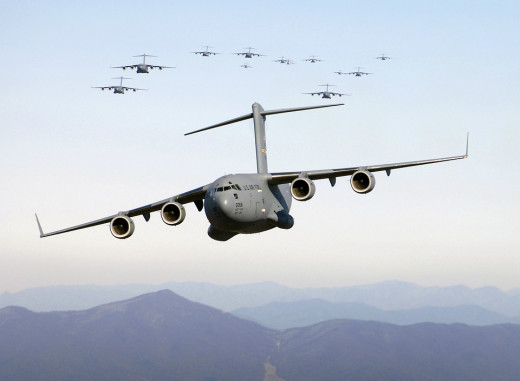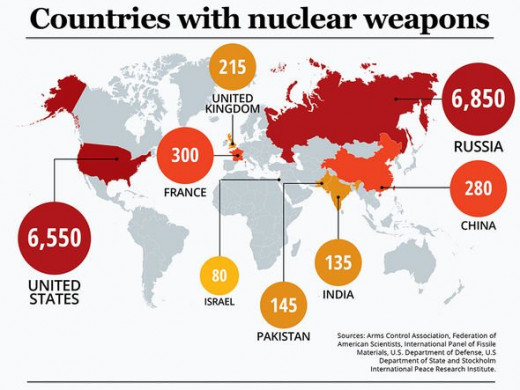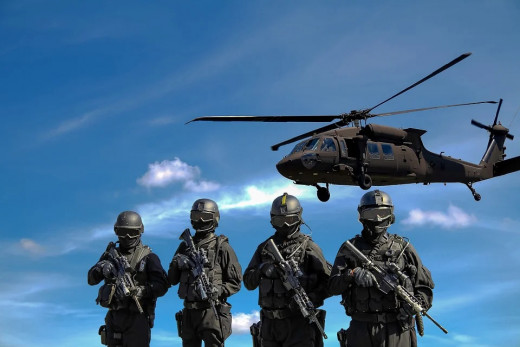The Reality of Future War
Experts are right to question whether future wars will be as we see them in movies. That is, machines will fight each other and man will be a spectator.

The bra of humanity and war is with the skirt. In the distant past, wars were fought with spears and swords. Then came the age of firearms and now the threat of a nuclear attack. Changes in tactics and weapons over time have forced war experts to think about the nature of future wars. Experts are wondering what kind of destruction weapons will wreak in the future and what will be the impact on nations and societies as a result. However, given the tremendous advances in technology, most military and social experts agree that technology and doctrines will play a central role in future wars. Then there is the phenomenal development of artificial intelligence and the successful cyber warfare that has led to the belief that in future wars the role of humans will be secondary and will be replaced by machines. Here the question arises that if this is indeed the case, then what will happen to the spirit and enthusiasm that is considered more important than the number of troops and weapons? Where will the great forces that are responsible for the integrity, security, and defense of their state go? What will be the measure of bravery and what will be the sacrifice of lives? Also, experts are right to question whether future wars will be as we see them in movies. That is, machines will fight each other and man will be a spectator.
Done That is why today even countries with modest military might and military technology develop atomic bombs and become a threat to even the superpowers, which is called the "balance of terror".

Balance of Terror
Although weapons of war and ideology have changed with each passing century and as a result military tactics have changed, there has been no precedent in known human history for such rapid changes during the nineteenth to twentieth centuries. After cannons, tanks and then bombers played an important role in wars. For example, during World War II, Allied forces repeatedly bombed the German forces with aerial bombardment. Similarly, in the Arab-Israeli War of 1967, Israel's powerful air force combined the Arab countries' combined military forces. On the first day (June 6), he thwarted his victory. Later, however, the use of nuclear weapons led to a nuclear change in the nature of wars. In 1945, the United States not only conquered two Japanese cities, Hiroshima and Nagasaki, by dropping atomic bombs, but also conquered every front, but also spread its wings around the world, making the atomic bomb a decisive weapon. Done That is why today even countries with modest military might and military technology develop atomic bombs and become a threat to even the superpowers, which is called the "balance of terror". Countries such as Iran and North Korea are also involved in the nuclear arms race, while Pakistan and India have also maintained a balance of power in the region through their nuclear power, but the atomic bomb is a weapon of mass destruction. Yes, so no country with nuclear power is willing to take the risk of using it. The atomic bomb not only targets the enemy country but also threatens to destabilize the country that uses it. There is also a risk of countries around the affected country being affected.
Chances of World War III
However, one of the positive consequences of the emergence of the deadliest weapon, such as the atomic bomb, is that world wars are no longer taking place. There is now a great deal of awareness in the developed world, and no major power today is willing to risk the use of the atomic bomb. After witnessing the horrific consequences of the First and Second World Wars, the people of the developed countries are terrified of the name of war and are moving towards a peaceful and standard of living. Today, all the focus of developed countries is on improving living standards and acquiring knowledge. The provision of state-of-the-art health facilities is increasing the average life expectancy of human beings and all countries are united in the fight against poverty and ignorance. This can be gauged from the fact that although the United States, China, and Russia are equipped with the latest weapons, they are not willing to fight each other directly at any cost and in any field. However, wars have now turned into civil wars, also known as "hybrid warfare". An example is a civil war in Syria over the past seven years, in which more than 500,000 Syrians have been killed and more than 12 million (half of Syria's population) have been displaced. Another example of hybrid warfare is the ongoing civil war and terrorism in Afghanistan, which is affecting more or less the whole world, while Pakistan has sacrificed more than 70,000 people and billions of dollars in the war on terror. And this is the biggest reason for the weakening of the Pakistani economy. Experts believe that climate change, sectarianism, extremism, and rapid population growth will exacerbate such wars.

After the 9/11 tragedy, the situation changed and most of the wars are now being fought in urban areas, as it is estimated that by 2040, two-thirds of the world's population will be living in cities.
After the 9/11 Tragedy
According to military experts, the war theory of air superiority was very effective until the Arab-Israeli war, but it needed to be reconsidered after the 1991 Gulf War. It was then suggested that the United States, due to its military capabilities, consisting of three elements such as precision-guided missiles, advanced intelligence methods, and space-controlling stealth technology, could be decisive in long-term wars. The West will win the wars without any major loss of life or property. It should be noted that there were no casualties in the first Gulf War and only military installations were targeted. However, after the 9/11 tragedy, the situation changed and most of the wars are now being fought in urban areas, as it is estimated that by 2040, two-thirds of the world's population will be living in cities. Keep in mind that the number of mega-cities has grown exponentially over the past two decades, with 29 cities with a population of more than 10 million coming into being. Managing these densely populated cities is becoming a challenge for governments as they themselves have taken the form of small countries. In this regard, the example of Karachi can be given, whose population is more than 20 million and it has become a hotbed of problems. According to experts, wars fought in cities are complicated by the fact that they are fought in the streets and require large numbers of troops, which is a problem in itself. Then the destruction of property during the war destroys the economy of the whole country. In this regard, the destruction of the Iraqi city, Mosul and Aleppo in Syria is before us. It should be noted that the restoration of other major Syrian cities, including Aleppo, after winning the war in Syria will be a major challenge for the Assad regime, as it will require substantial funding and Syria's allies such as Iran and Russia. They can't afford to pay that their economy is in shambles, while the situation is similar in Afghanistan and the world powers are not ready to come close.

According to experts, hybrid warfare refers to the combined use of military, economic, diplomatic, espionage, and, to a lesser extent, criminal activities to achieve its goals.
Hybrid Warfare
Today, only those who are willing to commit suicide can imagine a nuclear war between the world powers. However, there is no doubt that both China and Russia are unwilling to recognize the United States as the sole superpower, and both countries are increasing their military capabilities. Not only are China and Russia investing heavily in technology, but they are also willing to cooperate with any country that can provide them with the means. The military cooperation agreements between China and Israel and Russia and Israel are clear examples of this. Although both countries are willing to use military force to protect their interests, only in selected areas. Russia has used Crimea and Syria, while China has used the same strategy in the case of East Asian islands. This suggests that the world powers are engaged in a war without confrontation on the battlefield and this is called "hybrid warfare". According to experts, hybrid warfare refers to the combined use of military, economic, diplomatic, espionage, and, to a lesser extent, criminal activities to achieve its goals. Experts also believe that China and Russia do not want a direct war with the United States, but are trying to make victory the most difficult for the United States. Although Russia has used its strategy effectively in Syria and Ukraine, it is paying the price in the form of economic sanctions imposed on it by the United States and Europe. According to experts, nuclear weapons have succeeded in establishing a "balance of terror" and this trend will continue until the end of this century. The United States and Russia, on their own, occasionally threaten nuclear strikes. As US President, Trump has threatened to destroy North Korea and Iran. Similarly, Putin from time to time mentions his largest nuclear stockpile, even though it did not save the Soviet Union from chaos. It should be noted that the Nuclear Non-Proliferation Treaty (NPT) has long been awaiting restoration, which has prevented the Cold War from turning into a nuclear war.
United States has been working for the past 10 years to develop weapons that could destroy or destroy the enemy's nuclear assets without a nuclear attack. This type of system is called "Conventional Prompt Global Strike".
Pentagon Plans to take over the Technology
According to experts, there is currently a "balance of terror" between the world powers, but Russia and China are expressing fears that the United States is developing even more sophisticated nuclear weapons. Experts say the United States has been working for the past 10 years to develop weapons that could destroy or destroy the enemy's nuclear assets without a nuclear attack. This type of system is called "Conventional Prompt Global Strike". This system allows a conventional bomb to be delivered to a target at hyper-sonic speeds (five times faster than sound) in such a way that it disables even the most well-organized defense system. The system's targets could include terrorists, nuclear installations, anti-satellite weapons, and the enemy's control and command system. Military experts in China and Russia believe that the system could upset the balance of power, and they are reportedly developing similar systems. In this system, it will be difficult to identify the attacker and it will be impossible to retaliate. According to experts, one of the ways to destroy the nuclear system is through "killer robots", which work with artificial intelligence. Although they are still in their infancy, their usefulness in the form of drones can be gauged. These robots can kill humans at the push of a button. That is why scientists are calling for legislation against them, including world-renowned scientists such as Steven Hawkins. Which is not controlled by governments. In the United States, the Pentagon plans to take over the technology, but not in other countries. Therefore, at the moment there is no way to predict the effects of such weapons in future wars. However, it is certain that in war, moral values and human lives are the first targets, and everything becomes legitimate to achieve victory. It remains to be seen whether these factors will be overcome in future wars.

Who has the most advanced military technology?
This content reflects the personal opinions of the author. It is accurate and true to the best of the author’s knowledge and should not be substituted for impartial fact or advice in legal, political, or personal matters.
© 2020 Rao Muhammad Shahid Iqbal








